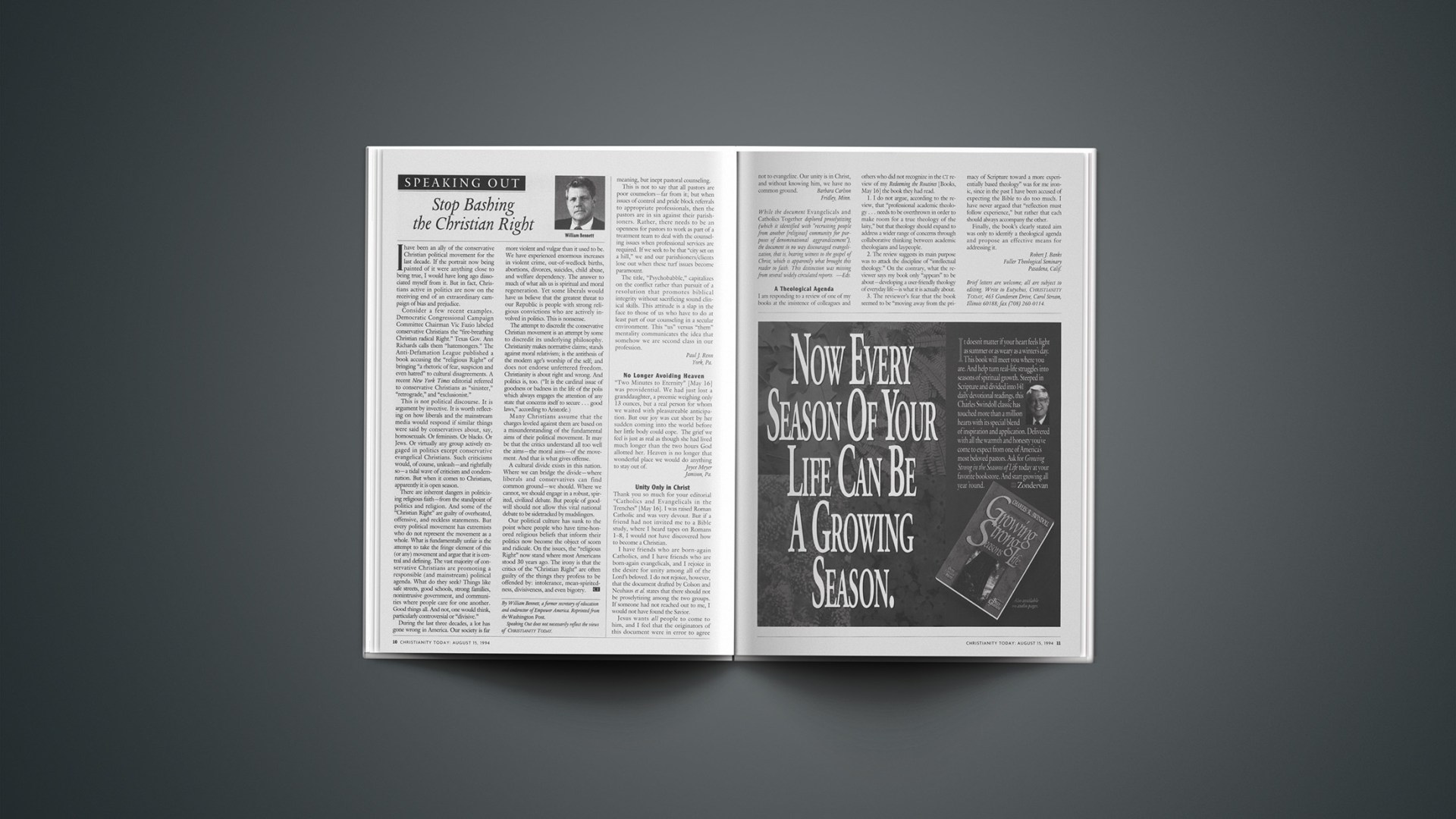I have been an ally of the conservative Christian political movement for the last decade. If the portrait now being painted of it were anything close to being true, I would have long ago dissociated myself from it. But in fact, Christians active in politics are now on the receiving end of an extraordinary campaign of bias and prejudice.
Consider a few recent examples. Democratic Congressional Campaign Committee Chairman Vic Fazio labeled conservative Christians the “fire-breathing Christian radical Right.” Texas Gov. Ann Richards calls them “hatemongers.” The Anti-Defamation League published a book accusing the “religious Right” of bringing “a rhetoric of fear, suspicion and even hatred” to cultural disagreements. A recent New York Times editorial referred to conservative Christians as “sinister,” “retrograde,” and “exclusionist.”
This is not political discourse. It is argument by invective. It is worth reflecting on how liberals and the mainstream media would respond if similar things were said by conservatives about, say, homosexuals. Or feminists. Or blacks. Or Jews. Or virtually any group actively engaged in politics except conservative evangelical Christians. Such criticisms would, of course, unleash—and rightfully so—a tidal wave of criticism and condemnation. But when it comes to Christians, apparently it is open season.
There are inherent dangers in politicizing religious faith—from the standpoint of politics and religion. And some of the “Christian Right” are guilty of overheated, offensive, and reckless statements. But every political movement has extremists who do not represent the movement as a whole. What is fundamentally unfair is the attempt to take the fringe element of this (or any) movement and argue that it is central and defining. The vast majority of conservative Christians are promoting a responsible (and mainstream) political agenda. What do they seek? Things like safe streets, good schools, strong families, nonintrusive government, and communities where people care for one another. Good things all. And not, one would think, particularly controversial or “divisive.”
During the last three decades, a lot has gone wrong in America. Our society is far more violent and vulgar than it used to be. We have experienced enormous increases in violent crime, out-of-wedlock births, abortions, divorces, suicides, child abuse, and welfare dependency. The answer to much of what ails us is spiritual and moral regeneration. Yet some liberals would have us believe that the greatest threat to our Republic is people with strong religious convictions who are actively involved in politics. This is nonsense.
The attempt to discredit the conservative Christian movement is an attempt by some to discredit its underlying philosophy. Christianity makes normative claims; stands against moral relativism; is the antithesis of the modern age’s worship of the self; and does not endorse unfettered freedom. Christianity is about right and wrong. And politics is, too. (“It is the cardinal issue of goodness or badness in the life of the polis which always engages the attention of any state that concerns itself to secure … good laws,” according to Aristotle.)
Many Christians assume that the charges leveled against them are based on a misunderstanding of the fundamental aims of their political movement. It may be that the critics understand all too well the aims—the moral aims—of the movement. And that is what gives offense.
A cultural divide exists in this nation. Where we can bridge the divide—where liberals and conservatives can find common ground—we should. Where we cannot, we should engage in a robust, spirited, civilized debate. But people of goodwill should not allow this vital national debate to be sidetracked by mudslingers.
Our political culture has sunk to the point where people who have time-honored religious beliefs that inform their politics now become the object of scorn and ridicule. On the issues, the “religious Right” now stand where most Americans stood 30 years ago. The irony is that the critics of the “Christian Right” are often guilty of the things they profess to be offended by: intolerance, mean-spiritedness, divisiveness, and even bigotry.
********************
William Bennett is a former Secretary of Education and codirector of Empower America. Reprinted from the Washington Post.
Speaking Out does not necessarily reflect the views of Christianity Today.
Copyright © 1994 Christianity Today. Click for reprint information.










